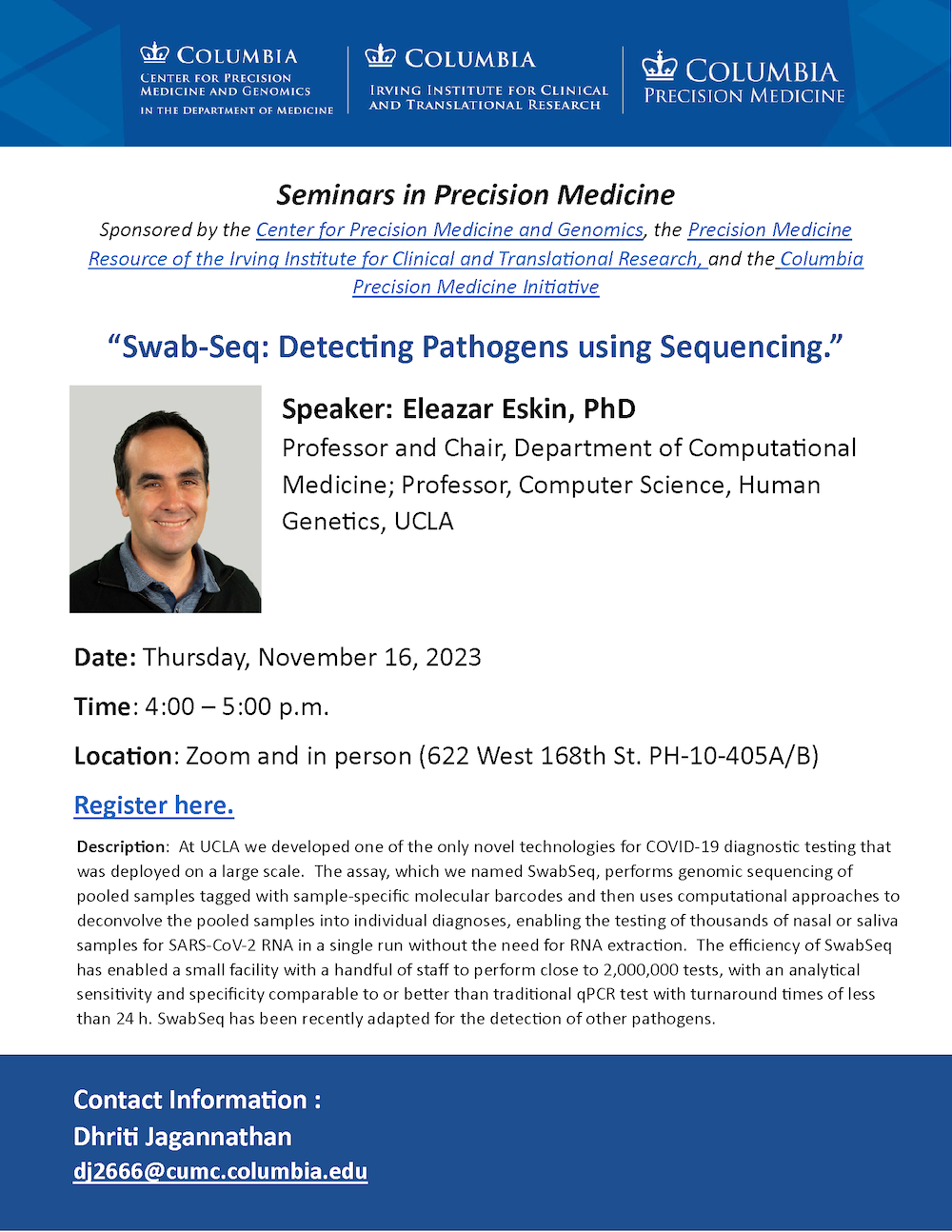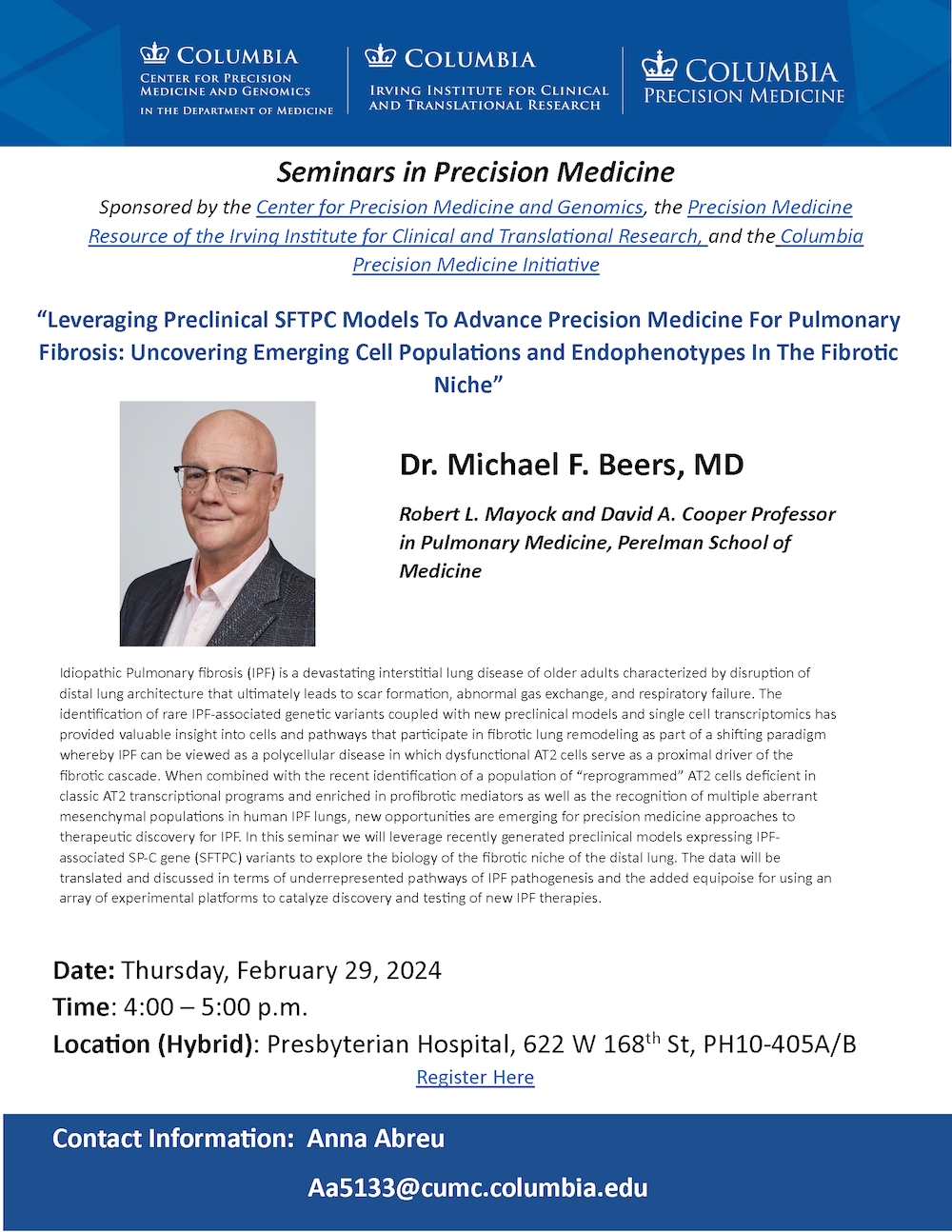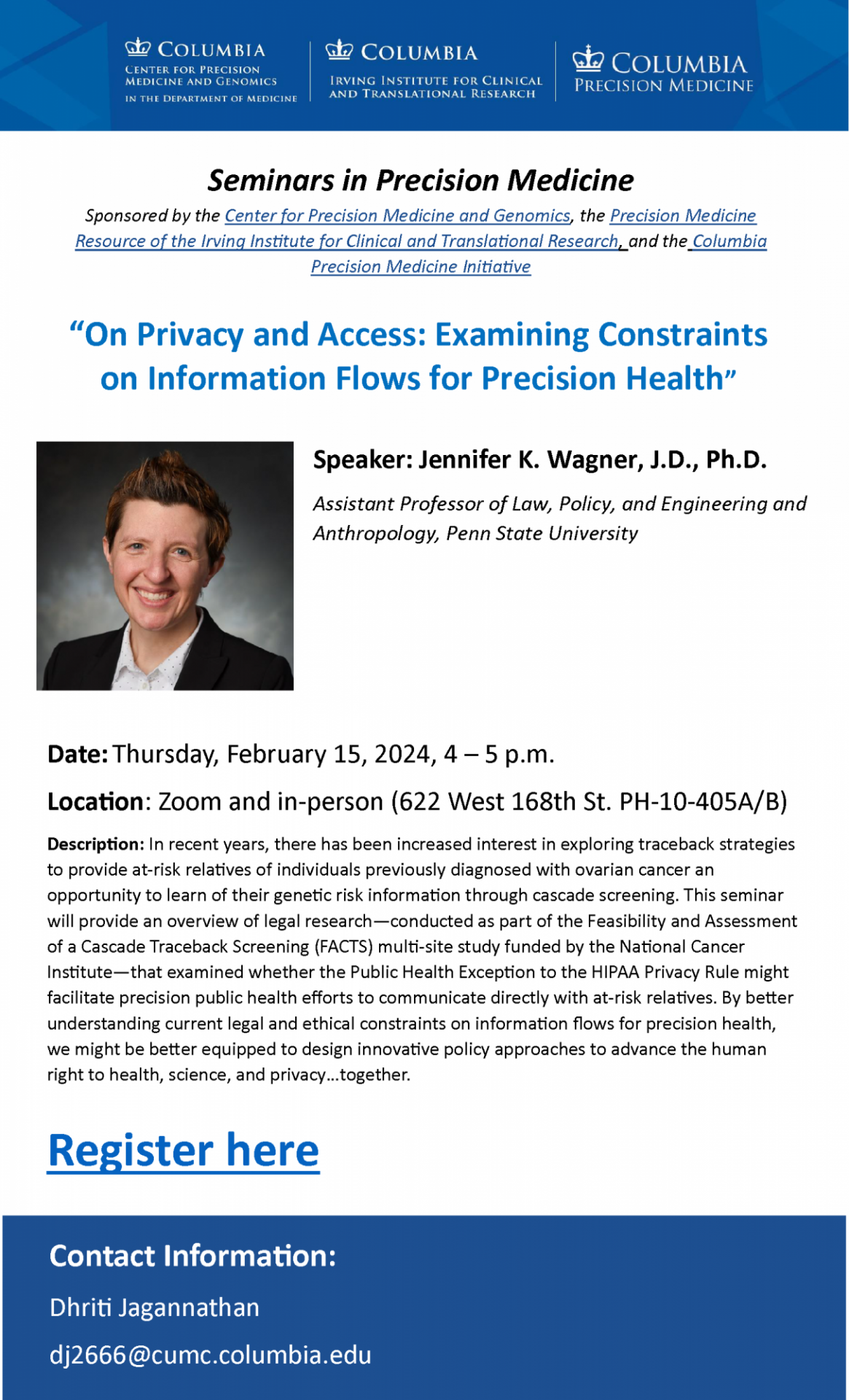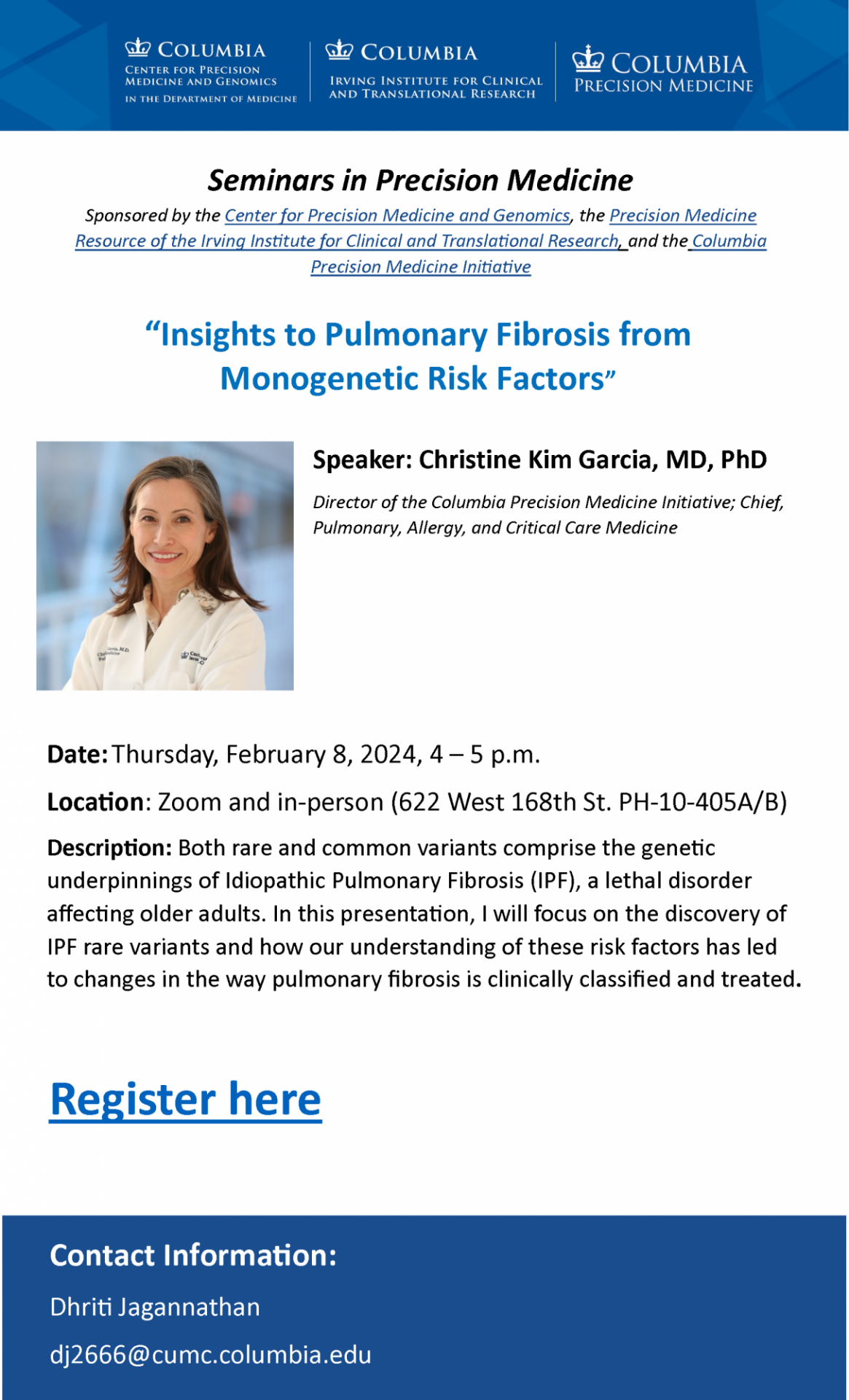Seminars in Precision Medicine
These events are hosted as part of the seminar series featuring leaders in precision medicine from across the nation. Co-presented by the Center for Precision Medicine and Genomics, the Columbia Precision Medicine Initiative, and the Precision Medicine Resource of the Irving Institute for Clinical and Translational Research. This event is supported in part by a gift from Pfizer to Columbia.
Seminars in Precision Medicine
Date: Thursday, April 18, 2024, 4 – 5 p.m.
Location: Zoom and in-person (622 West 168th St. PH-10-405A/B)
Speaker: John Stamatoyannopoulos, MD, Director, Altius Institute for Biomedical Sciences
"Nucleotide-precise control of gene expression by cis-regulatory interference"
Description: Gene regulation is fundamentally mediated by sequence-specific DNA binding proteins that engage regulatory DNA in the context of native chromatin. A longstanding goal in the field has been to understand the contribution of specific transcription factor recognition sites, both individually and combinatorially, to the transcriptional output of a given gene. In this talk I will describe a new approach – Cis-regulatory Interference – for nucleotide-precise probing and manipulation of gene expression without DNA modification by using synthetic DNA binding proteins encoded on single mRNA molecules.
Contact Information:
Dhriti Jagannathan
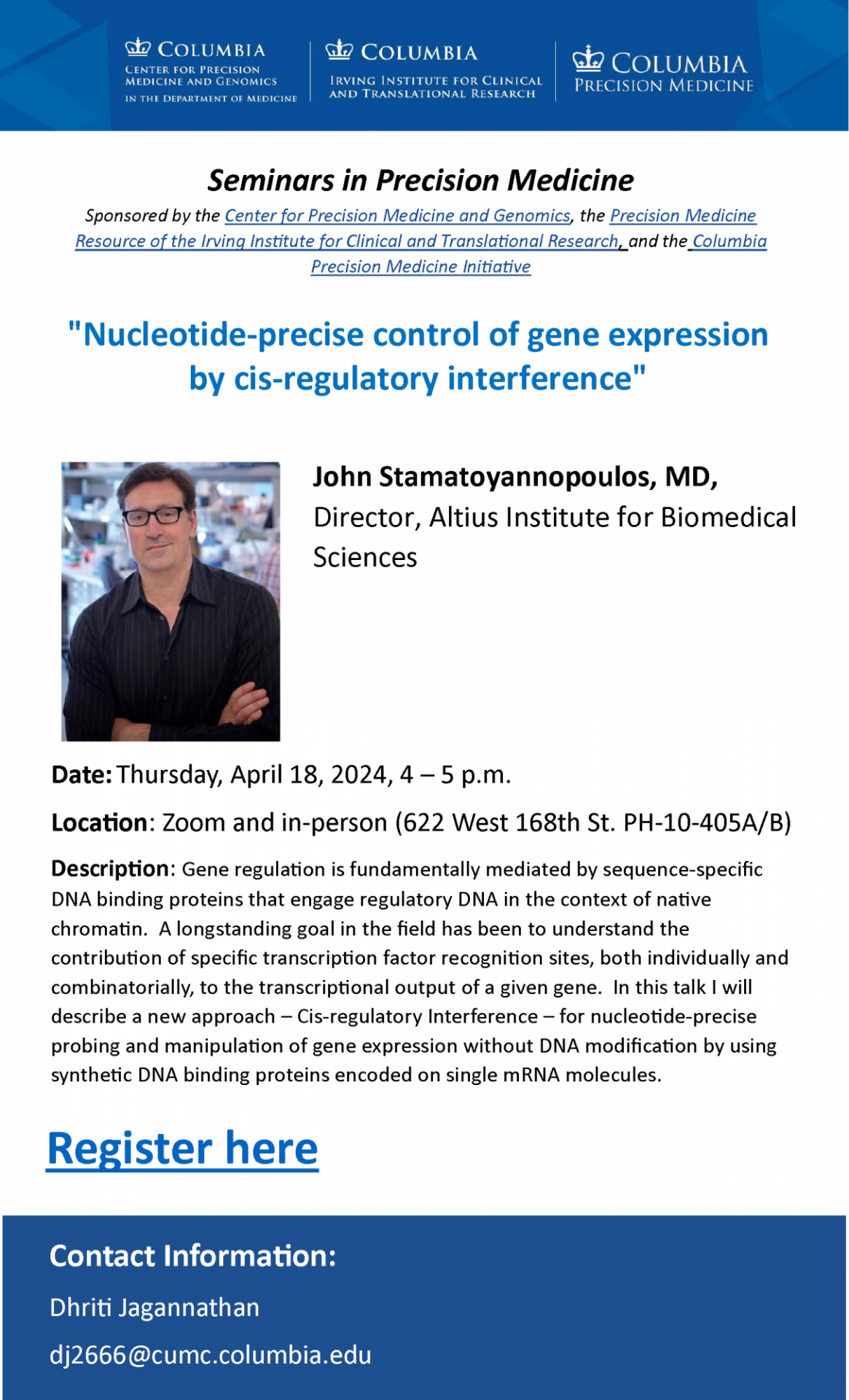
Date: Thursday, February 29, 2024
Time: 4:00 – 5:00 p.m.
Location (Hybrid): Presbyterian Hospital, 622 W 168th St, PH10-405A/B
Speaker: Michael Beers, MD; Robert L. Mayock and David A. Cooper Professor in Pulmonary Medicine, Perelman School of Medicine
Register for Zoom information.
“Leveraging Preclinical SFTPC Models To Advance Precision Medicine For Pulmonary Fibrosis: Uncovering Emerging Cell Populations and Endophenotypes In The Fibrotic Niche”
Idiopathic Pulmonary fibrosis (IPF) is a devastating interstitial lung disease of older adults characterized by disruption of distal lung architecture that ultimately leads to scar formation, abnormal gas exchange, and respiratory failure. The identification of rare IPF-associated genetic variants coupled with new preclinical models and single cell transcriptomics has provided valuable insight into cells and pathways that participate in fibrotic lung remodeling as part of a shifting paradigm whereby IPF can be viewed as a polycellular disease in which dysfunctional AT2 cells serve as a proximal driver of the fibrotic cascade. When combined with the recent identifica?on of a population of “reprogrammed” AT2 cells deficient in classic AT2 transcriptional programs and enriched in profibrotic mediators as well as the recognition of multiple aberrant mesenchymal populations in human IPF lungs, new opportunities are emerging for precision medicine approaches to therapeutic discovery for IPF. In this seminar we will leverage recently generated preclinical models expressing IPF-associated SP-C gene (SFTPC) variants to explore the biology of the fibrotic niche of the distal lung. The data will be translated and discussed in terms of underrepresented pathways of IPF pathogenesis and the added equipoise for using an array of experimental platforms to catalyze discovery and testing of new IPF therapies.
Contact Information: Anna Abreu
Date: Thursday, February 15, 2024
Time: 4:00 - 5:00 p.m.
Location: Zoom and in-person (622 West 168th St. PH-10-405A/B)
Speaker: Jennifer K. Wagner, JD, PhD, Assistant Professor of Law, Policy, and Engineering and Anthropology, Penn State University
“On Privacy and Access: Examining Constraints on Information Flows for Precision Health”
Description: In recent years, there has been increased interest in exploring traceback strategies to provide at-risk relatives of individuals previously diagnosed with ovarian cancer an opportunity to learn of their genetic risk information through cascade screening. This seminar will provide an overview of legal research—conducted as part of the Feasibility and Assessment of a Cascade Traceback Screening (FACTS) multi-site study funded by the National Cancer Institute—that examined whether the Public Health Exception to the HIPAA Privacy Rule might facilitate precision public health efforts to communicate directly with at-risk relatives. By better understanding current legal and ethical constraints on information flows for precision health, we might be better equipped to design innovative policy approaches to advance the human right to health, science, and privacy…together.
“Insights to Pulmonary Fibrosis from Monogenetic Risk Factors”
Speaker: Christine Kim Garcia, MD, PhD, Director of the Columbia Precision Medicine Initiative; Chief, Pulmonary, Allergy, and Critical Care Medicine
Date: Thursday, February 8, 2024, 4 – 5 p.m.
Location: Zoom and in-person (622 West 168th St. PH-10-405A/B)
Description: Both rare and common variants comprise the genetic underpinnings of Idiopathic Pulmonary Fibrosis (IPF), a lethal disorder affecting older adults. In this presentation, I will focus on the discovery of IPF rare variants and how our understanding of these risk factors has led to changes in the way pulmonary fibrosis is clinically classified and treated.
Date: Thursday, January 25, 2024
Time: 4pm - 5pm
Location: Zoom and In-person. Presbyterian Hospital - 622 W 168th St., PH10 405A/B, NY, NY 10032
Speaker: Noah Zaitlen, PhD, Professor, Department of Neurology and Computational Medicine, UCLA
Genetic Nosology: Leveraging Genetic Variation to Resolve Phenotypes
Zoom Link: Register here!
Refreshments will be served!
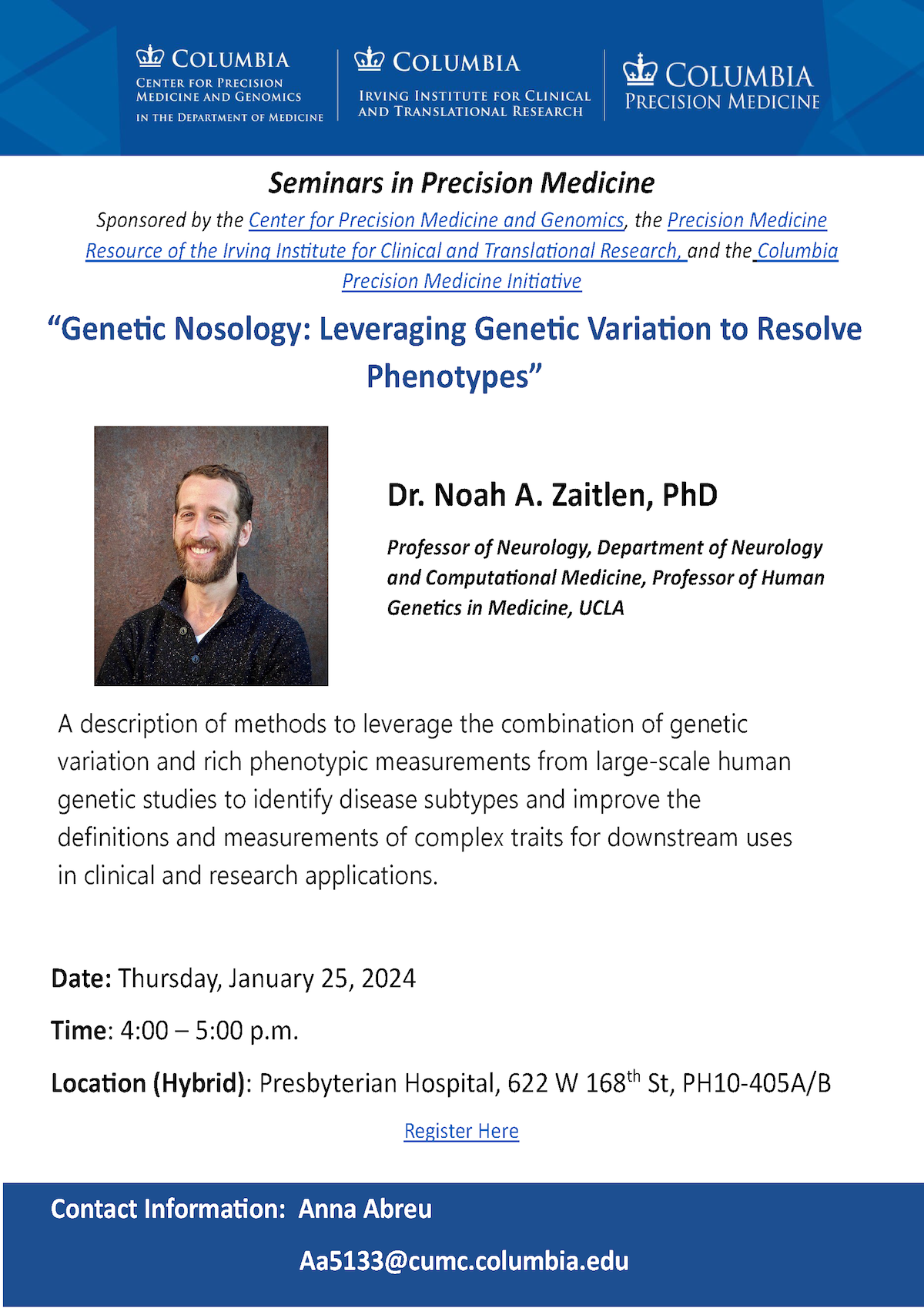
Speaker: Steven Hyman, MD; Director, Stanley Center for Psychiatric Research
Broad Institute of MIT and Harvard
January 18, 2024
4:00-5:00pm
This online event is hosted as part of the seminar series featuring leaders in precision medicine from across the nation. Co-presented by the Center for Precision Medicine and Genomics, the Columbia Precision Medicine Initiative, and the Precision Medicine Resource of the Irving Institute for Clinical and Translational Research. This event is supported in part by a gift from Pfizer to Columbia.
Event Contact Information:
Dhriti Jagannathan
[email protected]
Date: Thursday, December 14, 2023, 4 – 5 p.m.
Location: Zoom and in-person (622 West 168th St. PH-10-405A/B)
Speaker: Zhonghua Liu, PhD, Columbia University
Robust Mendelian randomization coupled with Alphafold2 for drug target discovery
Description: Mendelian randomization (MR) uses genetic variants as instrumental variables (IVs) to estimate the causal effect of a modifiable risk factor on the outcome of interest to remove unmeasured confounding bias. However, some genetic variants might be invalid IVs due to violations of core IV assumptions, for example, in the presence of population stratification and/or widespread horizontal pleiotropy. Inclusion of invalid genetic IVs for MR analysis might lead to biased causal effect estimate and misleading scientific conclusions. To address this challenge, we propose a novel MR method that first Selects valid genetic IVs and then performs Post-selection Inference (MR-SPI) based on two-sample genome-wide summary statistics. Extensive Monte Carlo simulation studies demonstrate the superior performance of MR-SPI. We apply MR-SPI to analyze 146 exposure-outcome pairs to establish putative causal relationships. We further analyze 912 plasma proteins using the large-scale UK Biobank proteomics data in 54,219 UK Biobank participants and identify 7 proteins significantly associated with the risk of Alzheimer's disease. We also apply AlphaFold2 to predict the three-dimensional (3D) structural alteration of these 7 proteins due to genetic variations.
Contact Information:
Dhriti Jagannathan
Speakers: Dr. Rebecca Jordan-Young, PhD, Ann Whitney Olin Professor Women's, Gender, & Sexuality Studies, Barnard College, Co-Director, Precision Medicine & Society Program, Columbia University and Dr. Sandra Soo-Jin Lee, PhD, Chief of Division of Ethics, Professor of Medical Humanities and Ethics
Precision in Practice with Population Descriptors
Date: Thursday, November 30th , 2023
Time: 4pm - 5pm
Location: Presbyterian Hospital, PH10 405A/B, 622 W 168th St., NY, NY 10032
Zoom Link: https://columbiacuimc.zoom.us/j/92284682154
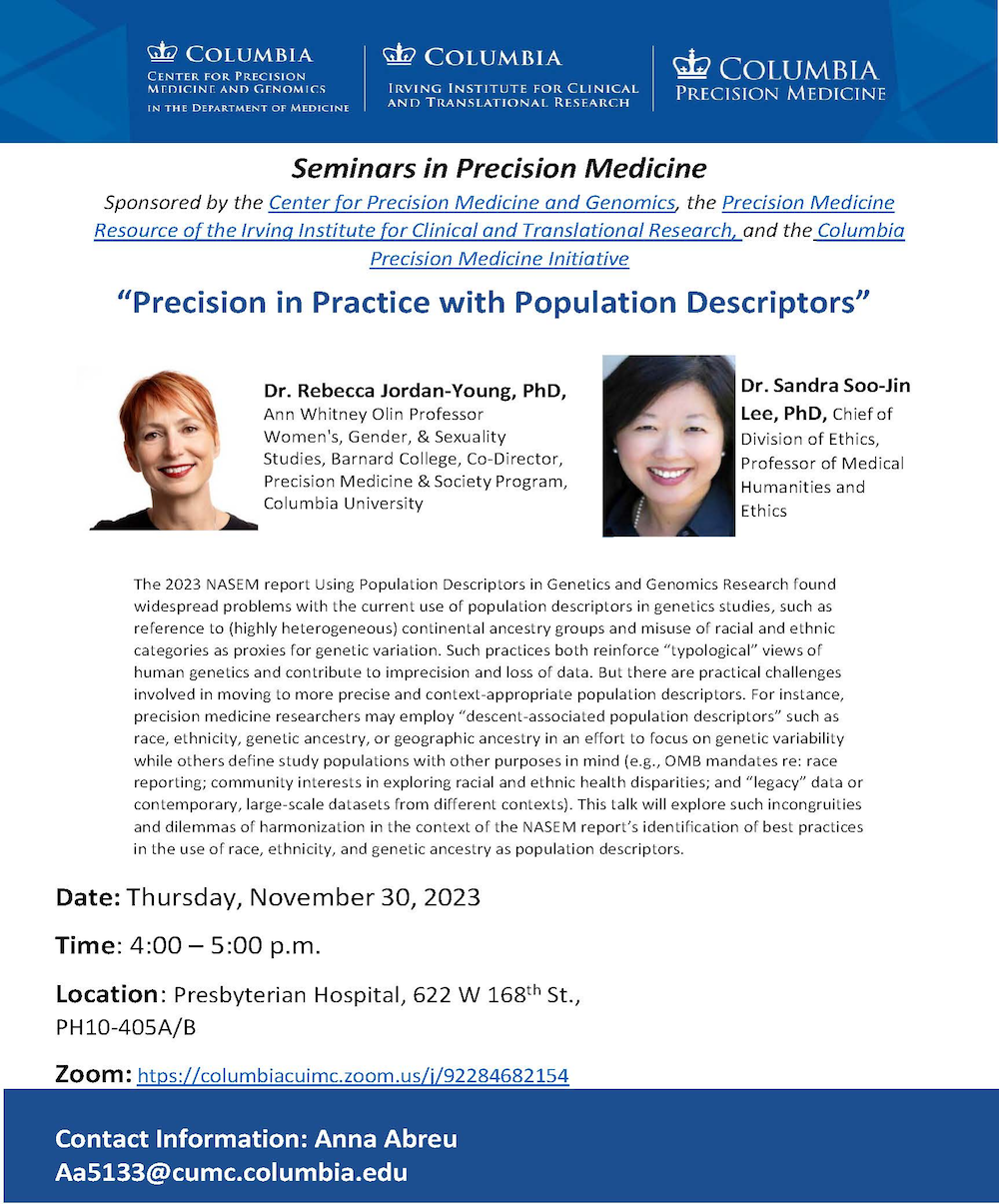
Date: Thursday, November 16, 2023
Time: 4:00 – 5:00 p.m.
Location: Zoom and in person (622 West 168th St. PH-10-405A/B)
Speaker: Eleazar Eskin, PhD Professor and Chair, Department of Computational Medicine; Professor, Computer Science, Human Genetics, UCLA
Swab-Seq: Detec?ng Pathogens using Sequencing
Description: At UCLA we developed one of the only novel technologies for COVID-19 diagnostic testing that was deployed on a large scale. The assay, which we named SwabSeq, performs genomic sequencing of pooled samples tagged with sample-specific molecular barcodes and then uses computational approaches to deconvolve the pooled samples into individual diagnoses, enabling the testing of thousands of nasal or saliva samples for SARS-CoV-2 RNA in a single run without the need for RNA extraction. The efficiency of SwabSeq has enabled a small facility with a handful of staff to perform close to 2,000,000 tests, with an analytical sensitivity and specificity comparable to or better than traditional qPCR test with turnaround times of less than 24 h. SwabSeq has been recently adapted for the detection of other pathogens.
